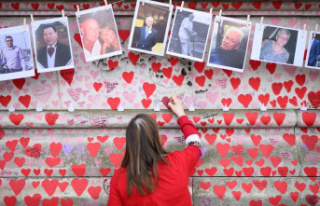The government announced that tariffs on steel imports due to expire would be kept for two more years.
Anne-Marie Trevelyan, International Trade Secretary, stated that the plans were not in accordance with the UK's international legal obligations but was in the national interest to protect steelmakers.
She said that the decision was due to "global disruptions to energy markets, supply chains"
Rising energy prices are putting pressure on British steel producers.
Steelmaking is an important industry in some parts of the UK. It employs 34,000 people, and generates PS2bn each year.
The government warned that if there are no controls, the UK's steel supply could increase significantly. This would be detrimental to local producers.
UK Steel stated previously that ending import restrictions could cause damage of up to PS150m per year.
Boris Johnson, Prime Minister of the United Kingdom, stated that maintaining import controls on foreign-steel steel would help protect metal producers at the G7 summit in Germany.
However, there are concerns that such a decision could violate international law. The question of extending steel import tariffs is seen to be potentially violating WTO commitments.
Ms Trevelyan stated that the decision "departs form our international legal obligations" under a WTO agreement.
She added that "occasionally, there may be issues where the national interest requires us to take action."
In response to Trump's tariffs, the European Union introduced steel import restrictions in 2018. After Brexit, the UK mirrored these controls.
These restrictions are also known as steel safeguards. They are intended to protect the domestic steel market from cheap steel imported from abroad.
Johnson stated that British steel is needed to provide cheaper energy.
The current controls are in place for 15 types of steel. Controls protecting 10 of these categories have been extended to 2024. Import limits for five categories will expire on June 30, after the government extended them for a further two years.
Although steelmaking is only 0.1% of the UK's economy, it is used in key sectors such as defense and transport. This makes steelmaking an industry that can be protected from cheaper imports.
This is why the EU applied tariffs on some types of foreign-steel steel in 2018, when the UK joined the EU.
The UK has now chosen to surrender many of these controls.
This move was expected for several months and was reported by the media as the reason Lord Geidt, the Prime Minister's ethics advisor, resigned. However, he later dismissed it as a distraction.
Anne Marie Trevelyan, Trade Secretary, acknowledges that the extension of tariffs may be in contradiction with World Trade Organization rules. However, she claims that it is a sign of extremely difficult times for the industry especially given the high energy prices.
In the hopes of avoiding a challenge, she has been consulting other countries. She also attracted controversy by missing a parliamentary hearing about the Australian trade agreement.
It is clear that the US and EU also retain similar tariffs. This highlights the difficult choices of removing trade barriers and protecting national businesses.
Alasdair MacDiarmid, Operations Director of the Steelworkers' Union Community, welcomed the extension, calling it "extremely important".
He stated that the government made the right decision because giving up our safeguards when the EU or US are keeping theirs would expose us to import surges that could threaten thousands of jobs.
Ms Trevelyan stated that maintaining tariffs would protect a strategic industry, and that British steel producers could suffer "serious injury" if they were not maintained.
She added that "The government is therefore actively engaging with interested parties, even those from outside the UK, on the future UK safeguards and has listened" to the concerns.
UK Steel, the largest British trade organization representing the industry, stated that the measures were "absolutely essential to the long-term sustainability of the UK steel industry".
Richard Warren, UK Steel's head of policy, stated that "deficient or absent safeguards measures could risk trade diversion away form shielded markets elsewhere, leading to surges in imports into the UK."
Nick Thomas-Symonds is Labour's shadow international trade secretary. He said that "the extension of safeguards would come as a relief to the steel industry.
He stated that it was not anti-competitive for the steel industry to have a level playing ground. "I support the decision to exclude Ukrainian Steel."
Some people were critical of the move, claiming it would reduce the supply of steel that is not made in the UK.
Although it is a "step forward", Confederation of British Metalworkers boss Steve Morley stated that the tariffs increase the "very real possibility of lost orders or production being moved away" from the UK.
He stated that "British Steel Mills have not been in a position to supply the... materials needed by our members to support critical supply chains for domestic and international exports, nor is it likely that they will be able to in the near future."












